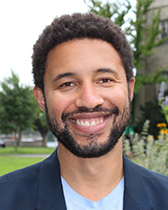Alumni Spotlight: Benjamin McDonald
 Benjamin McDonald, a 2018 Ph.D. graduate from the Scheidt Lab, is an Assistant Professor at Brown University. The McDonald Lab develops polymers as tailorable nanomaterials with programmable self-assembly, nanostructure, and reactivity. Their core philosophy is to mimic the precise chemical tailoring that enables the function of nature’s assembled and reactive organic materials.
Benjamin McDonald, a 2018 Ph.D. graduate from the Scheidt Lab, is an Assistant Professor at Brown University. The McDonald Lab develops polymers as tailorable nanomaterials with programmable self-assembly, nanostructure, and reactivity. Their core philosophy is to mimic the precise chemical tailoring that enables the function of nature’s assembled and reactive organic materials.
You attended Northwestern from 2014-2019. How did your time in the Department shape you and inspire your current work as a professor?
At Northwestern I got to explore my interest in the molecular world, particularly devising nature-inspired methods to construct small organic molecules. This was rigorous training and I later learned to appreciate that I had been dually trained as a scientist, an asker and answerer of fundamental questions, and as an engineer, a problem solver. This was empowering–my training gave me the ability to design and make new molecules and provides a broad freedom to exercise creativity in science. My research program at Brown applies what I learned about the design molecular and precision synthesis of small molecules to developing synthetic polymers that resemble the structure and function of biological macromolecules, but operate in contexts well beyond that of biology!
How would you explain your area of research to non-scientists? What drew you to this line of research?
We construct soft matter, squishy liquids and solids, from a biology-inspired molecule-up perspective. Nature turns ordinary materials into extraordinary ones by simply controlling how they are arranged! A simple example of this is the difference between JELL-O and many of the amazing tissues in our body such as skin, arteries, and cartilage. JELL-O is the result of disrupting the precise organization of molecular interactions along a slew of length scales that span about ten orders of magnitude. Our goal is to translate this multiscale paradigm to programming the assembly, structure, and function of synthetic materials for new opportunities to improve human health and technologies. This research has been a long time coming. I’ve always been fundamentally curious about the mechanics of the material world. In completing my undergraduate studies, I realized that chemistry provides a nice set of concepts and models to understand the world, from the fundamentals of how matter interacts and reacts, to how these entities, seemingly abstract from the human experience actually define that experience. Working in a synthetic chemistry laboratory was further enthralling, as it seemed like the closest thing you can get to being a wizard!
You did research in Karl Scheidt’s group while at NU. Can you tell us a memorable part of that experience?
I’m very proud to have worked with Karl. I came to Northwestern from a small PUI, never having met a PhD student. Despite that background, Karl was excited to have me attend NU and join his research group. I have so many memories from my time in the lab, but my favorites are outings with the lab on the lakefront and late nights in Silverman Hall.
Is there any advice you could give current Department students?
One of the most surprising things I learned as a graduate student is that science is a sort of “faith-based” endeavor. Starting, you have no idea if you will live up to your expectations or even successfully complete the program! To put yourself in a position to succeed, an incredible amount of trust and belief in the process is required. The single most important bit of advice I could give is to believe in yourself. In the short term, believe in your capability to overcome the challenge in front of you, and the longer term, believe that you will adapt to the ever-expanding sets of challenges and responsibilities. And finally, remember, it’s not necessarily about reaching the highest peak, but the area under the curve, which comes with time.
Where do you hope to be in your career in the next 10 years?
I hope to have a well-funded research group that has the freedom to explore our diverse scientific interests and to have a nice network of former students who careers continue to grow!
What is a hobby or activity you do outside of teaching Chemistry
I love being outside–Rhode Island is an absolutely beautiful state! Despite its tiny size, it has so many beautiful places to explore, via hiking, biking, climbing, or just walking around.
